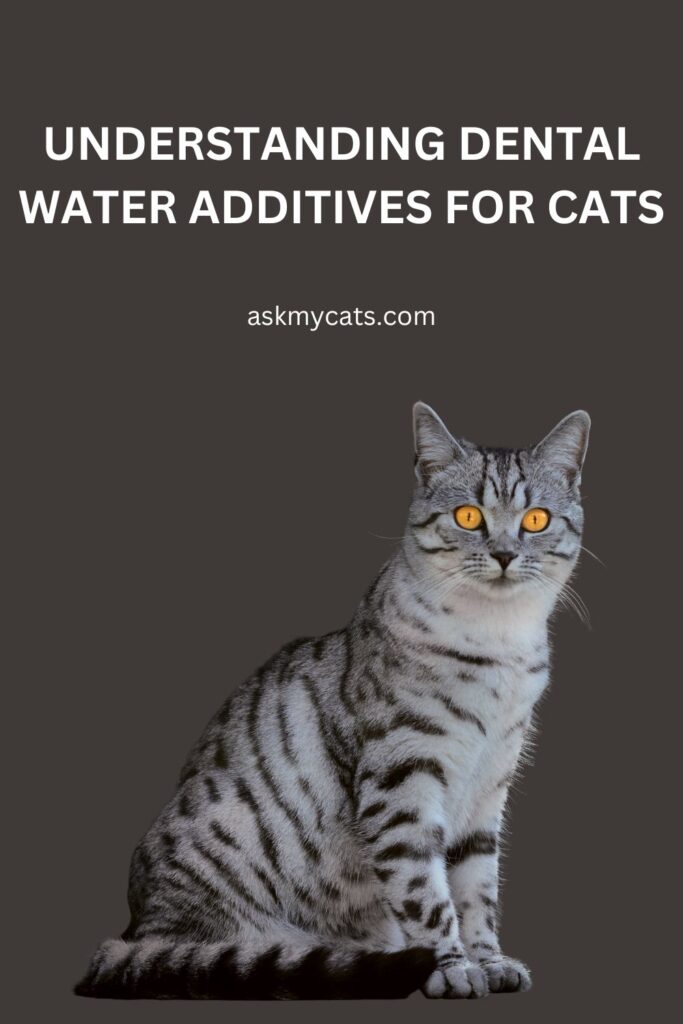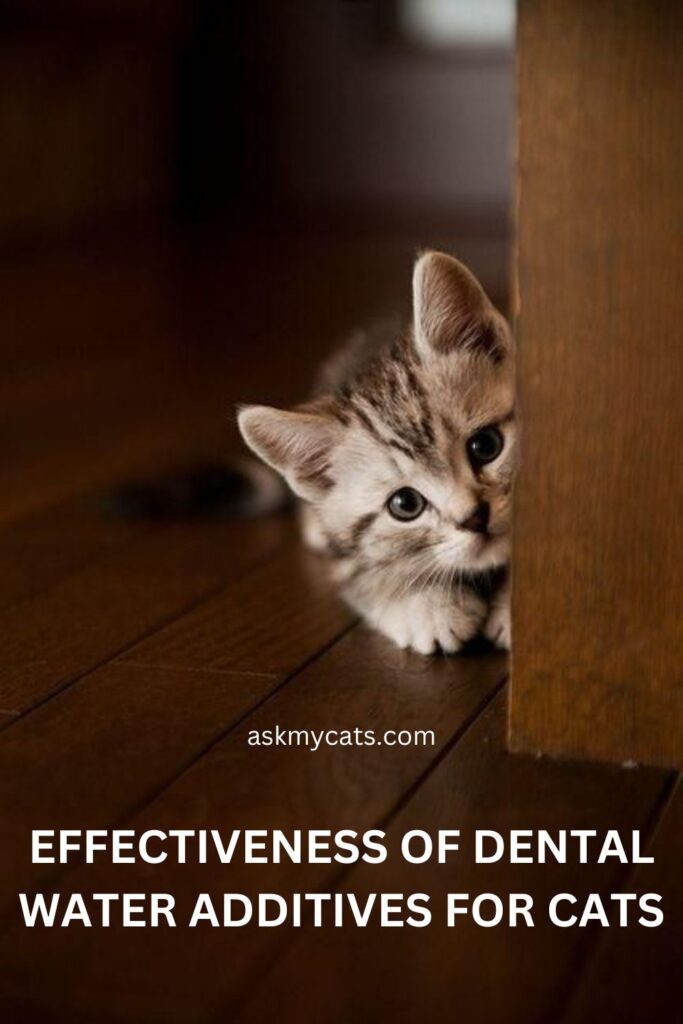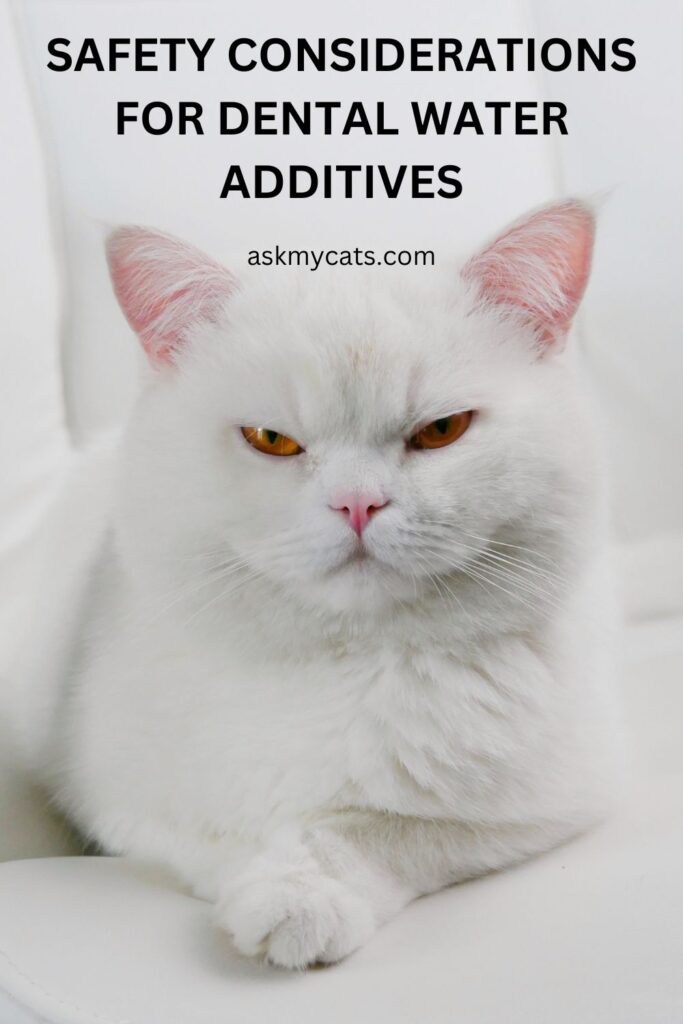Maintaining optimal dental health is crucial for cats to lead a comfortable and healthy life. Alongside regular veterinary check-ups and dental care, several products are available on the market to promote feline oral hygiene.
One such product gaining popularity is dental water additives.
In this article, we will explore the effectiveness and safety of dental water additives for cats, their usage instructions, and whether they can be added to cat food or fountains.
Key Takeaways
- Dental water additives prevent tartar and plaque buildup, freshen breath, and maintain dental cleanliness.
- Ingredients may vary, including enzymes, antimicrobial agents, and substances for tartar control.
- Studies show certain additives can reduce plaque, inhibit bacterial growth, and improve oral health.
- Follow recommended dosage instructions and consult with a veterinarian.
- Monitor for adverse reactions and consider individual sensitivities.
- Adding dental water additives to cat food is generally not recommended.
- Adding dental water additives to cat fountains is usually safe, but check compatibility and clean regularly.


Give Your Cat the Perfect Day
Get the Free Ebook!
Understanding Dental Water Additives for Cats

Dental water additives for cats are specially formulated solutions that can be added to a cat’s drinking water to promote oral hygiene and improve dental health.
These additives typically contain specific ingredients that help prevent tartar and plaque buildup, freshen breath, and maintain overall dental cleanliness.
The primary purpose of dental water additives is to provide an additional layer of oral care beyond regular brushing or dental treatments.
They are designed to be convenient and easy to use, as cats naturally consume the additive while drinking water. This eliminates the need for direct application or administration, which can sometimes be challenging with cats.
The specific ingredients in dental water additives can vary depending on the brand and product. Common ingredients include enzymes (such as glucose oxidase and lactoperoxidase), antimicrobial agents (like chlorhexidine or cetylpyridinium chloride), and substances that help control tartar formation (such as zinc citrate).
These ingredients work together to combat bacteria, reduce plaque and tartar, freshen breath, and support overall oral health in cats.
Common Ingredients in Dental Water Additives for Cats
| Ingredient | Purpose |
|---|---|
| Chlorhexidine | Antimicrobial agent, helps reduce plaque and gingivitis |
| Cetylpyridinium chloride | Antimicrobial agent, helps control oral bacteria |
| Sodium hexametaphosphate | Tartar control, prevents the formation of calculus |
| Zinc gluconate | Helps reduce plaque and gingivitis, freshens breath |
| Sodium bicarbonate | Helps neutralize acids in the mouth, reduces plaque |
| Vitamin C | Supports gum health, aids in collagen production |
Effectiveness of Dental Water Additives for Cats

The effectiveness of dental water additives for cats can vary depending on several factors, including the specific product used, the cat’s individual oral health, and the consistency of usage.
While some dental water additives have been clinically tested and shown to be effective in reducing plaque and tartar accumulation, others may not provide significant benefits.
Several studies have investigated the efficacy of dental water additives in cats.
These studies have shown that certain additives, particularly those containing enzymes and antimicrobial agents, can help reduce plaque formation, inhibit bacterial growth, and improve overall oral health.
However, it’s important to note that individual results may vary, and not all cats may respond equally to dental water additives.
The effectiveness of dental water additives also depends on proper usage and adherence to recommended dosage instructions. Consistency is key, and regular, daily use is necessary to achieve optimal results.
It’s important to follow the instructions provided by the manufacturer and consult with your veterinarian for guidance on the most suitable dental water additive for your cat’s specific needs.
Additionally, dental water additives should be used as part of a comprehensive oral care routine that includes regular veterinary dental check-ups, professional cleanings, and appropriate brushing techniques.
Combining these practices can contribute to improved dental health in cats.
Benefits of Dental Water Additives for Cats
| Benefit | Description |
|---|---|
| Freshens breath | Dental water additives can help eliminate bad breath caused by oral bacteria and plaque buildup. |
| Reduces plaque and tartar formation | The active ingredients in dental water additives can help prevent the formation of plaque and tartar on teeth. |
| Supports gum health | Some dental water additives contain ingredients like Vitamin C, which promote healthy gums in cats. |
| Convenient and easy to use | Dental water additives can be added to a cat’s water bowl, making it a simple and hassle-free oral care option. |
Safety Considerations for Dental Water Additives

When considering the safety of dental water additives for cats, it’s important to keep the following considerations in mind:
1. Choose veterinary-approved products:
Select dental water additives that are specifically formulated for cats and have been approved or recommended by reputable veterinary organizations. These products are more likely to undergo rigorous testing for safety and efficacy.
2. Consult with your veterinarian:
Before introducing any dental water additive to your cat, it’s advisable to consult with your veterinarian.
They can provide guidance based on your cat’s individual health needs and ensure that the product is safe to use alongside any existing medications or health conditions.
3. Follow dosage instructions:
Adhere strictly to the recommended dosage instructions provided by the manufacturer. Using more than the recommended amount can potentially lead to adverse effects, while using too little may not provide the desired dental benefits.
4. Monitor for adverse reactions:
After introducing a dental water additive, closely observe your cat for any signs of adverse reactions.
These may include gastrointestinal upset, allergic reactions, changes in behavior, or any other unusual symptoms. If you notice any concerning reactions, discontinue use and consult your veterinarian.
5. Consider individual sensitivities:
Cats can have individual sensitivities or allergies to certain ingredients. Pay attention to the ingredients list of the dental water additive and be cautious if your cat has previously shown sensitivity or allergies to any of the included substances.
6. Store and handle with care:
Store dental water additives in a secure place, out of reach of children and pets. Follow proper handling instructions and avoid accidental ingestion or exposure to concentrated additives.
Must Read: How to Brush a Cat’s Teeth: Step-by-Step Guide
How to Use Dental Water Additives for Cats?
Using dental water additives for cats is relatively simple. Follow these steps to incorporate them into your cat’s oral care routine:
Select a suitable dental water additive:
Choose a dental water additive that is specifically formulated for cats and approved by reputable veterinary organizations. Ensure it meets your cat’s specific dental needs and addresses any concerns you may have, such as plaque and tartar buildup or bad breath.
Read and follow the instructions:
Carefully read the instructions provided by the manufacturer. Follow the recommended dosage instructions, as well as any specific guidelines or precautions mentioned for the particular product you’re using.
Prepare fresh, clean water:
Fill your cat’s water bowl with fresh, clean water. Ensure that the bowl is free from any contaminants and regularly clean it to maintain good hygiene.
Add the dental water additive:
Measure and add the appropriate amount of the dental water additive to the water in your cat’s bowl. Follow the recommended dosage provided by the manufacturer. It’s essential to add the additive in the correct proportion to ensure its effectiveness and safety.
Mix the water gently:
Use a spoon or gently swirl the water to ensure the dental water additive is evenly distributed throughout the bowl. This will help ensure that your cat consumes the additive when they drink from the bowl.
Provide the water bowl to your cat:
Place the water bowl with the dental water additive in your cat’s usual drinking area. Ensure that the water is easily accessible for your cat to drink throughout the day.
Monitor and maintain consistency:
Encourage your cat to drink from the water bowl regularly. Monitor their drinking habits to ensure they are consuming the water with the dental water additive consistently. Consistency is key for optimal results.
Regularly clean the water bowl:
Clean the water bowl regularly to maintain good hygiene and prevent the buildup of bacteria or residue. Follow the manufacturer’s instructions for cleaning the bowl or use mild soap and water to wash it thoroughly.
Adding Dental Water Additive to Cat Food
It is generally not recommended to add dental water additives directly to cat food. Dental water additives are specifically formulated to be added to drinking water and consumed by cats during regular drinking sessions.
Adding the additive to cat food may alter the taste, texture, and consistency of the food, potentially leading to decreased appetite or refusal to eat.
Furthermore, diluting the dental water additive in water ensures that it reaches all areas of your cat’s mouth, allowing for comprehensive coverage and potential oral health benefits. Adding it directly to cat food may not provide the same level of effectiveness.
To maintain oral hygiene and promote dental health, it is best to follow the instructions provided by the manufacturer and add the dental water additive to your cat’s drinking water as recommended.
This way, your cat can consume the additive during their regular drinking routine, maximizing its potential benefits for their oral health.
Using Dental Water Additives with Cat Fountains
If you use a cat fountain as the primary source of water for your cat, you may wonder if dental water additives can be added to the fountain.
In most cases, it is safe to add dental water additives to cat fountains, but there are some important considerations to keep in mind:
1. Check the compatibility:
Ensure that the dental water additive you are using is compatible with the materials of your cat fountain. Some additives may react with certain materials or components of the fountain, potentially causing damage or affecting the water quality.
Refer to the manufacturer’s instructions or consult with the dental water additive manufacturer to ensure compatibility.
3. Clean the fountain regularly:
Cat fountains require regular cleaning to prevent the buildup of bacteria, debris, or residue. Dental water additives may leave behind residue or interact with other substances in the fountain.
Follow the manufacturer’s instructions for cleaning and maintenance to ensure that the water remains fresh, clean, and safe to drink for your cat.
3. Follow dosage instructions:
Add the recommended dosage of the dental water additive to the cat fountain, taking into account the water volume that the fountain holds. Follow the instructions provided by the manufacturer to ensure the correct amount of additive is added.
4. Monitor water consumption:
Keep an eye on your cat’s water consumption to ensure they are drinking from the fountain consistently. If you notice any changes in their drinking habits, it may be necessary to reassess the use of the dental water additive or consult with your veterinarian.
Frequently Asked Questions
What are dental water additives for cats?
Dental water additives are solutions added to a cat’s drinking water to promote oral hygiene and improve dental health.
Are dental water additives safe for cats?
Dental water additives specifically formulated for cats and approved by reputable veterinary organizations are generally considered safe. However, it’s important to follow dosage instructions and consult with a veterinarian if needed.
How do you use dental water additives for cats?
Add the recommended dosage of the dental water additive to your cat’s fresh, clean water. Mix gently and provide the water bowl to your cat for regular drinking.
Can dental water additives be added to cat food?
It is generally not recommended to add dental water additives directly to cat food as it may alter the taste and consistency. They are designed to be used with drinking water.
Can dental water additives be added to a cat fountain?
In most cases, it is safe to add dental water additives to cat fountains. However, ensure compatibility with the fountain’s materials and clean the fountain regularly to maintain water quality.
Do dental water additives for cats work?
The effectiveness of dental water additives can vary. Some additives have been clinically tested and shown to reduce plaque and tartar, while others may not provide significant benefits. Individual results may vary.
Final Words
Dental water additives for cats can be a convenient addition to their oral hygiene routine.
While effectiveness may vary among products, using a dental water additive that has been clinically tested and approved by veterinarians can help promote better dental health for your feline companion.
Remember to consult with your veterinarian before introducing any new product and follow the usage instructions to ensure your cat’s safety and well-being.
Interesting Read: Home Remedies for Cat Tartar Removal
